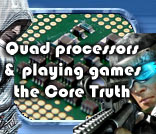1 - A Quadruple introduction

CPU scaling in games with quad-core processors
The core truth ...
 Each year the topic of CPU scaling comes to mind in relation to gaming. Especially when we see new processors enter the market time after time I ask myself again; how much influence do these new model processors actually have? There have been some dramatic changes over the past couple of years though as processor manufacturers have hit a hard brick wall. That wall being the incremental increase of the clock frequency, or moreover ... the lack of it. Somehow everything stops at 3200 MHz in the processor R&D segment and for years now the fastest clocked processors never have exceeded that magic number. Surely we overclock much higher and new records have been set at 4 and with LN2 sub-zero temperature cooling reaching 5 GHz, for us 'regular' consumers we stick at that 3.2 GHz frequency border.
Each year the topic of CPU scaling comes to mind in relation to gaming. Especially when we see new processors enter the market time after time I ask myself again; how much influence do these new model processors actually have? There have been some dramatic changes over the past couple of years though as processor manufacturers have hit a hard brick wall. That wall being the incremental increase of the clock frequency, or moreover ... the lack of it. Somehow everything stops at 3200 MHz in the processor R&D segment and for years now the fastest clocked processors never have exceeded that magic number. Surely we overclock much higher and new records have been set at 4 and with LN2 sub-zero temperature cooling reaching 5 GHz, for us 'regular' consumers we stick at that 3.2 GHz frequency border.
Apparently it's difficult to get the hundreds of millions transistors clocked higher. Therefore in an attempt to divert that fundamental issue, a couple of years ago we saw the introduction of multi-core processors. See, it's way more easy to shrink the die-size of a processor than to get it faster clocked. Shrinking die's makes more room for other stuff. Moore's Law ceased to exist and became Moores laws (e.g. multiple). Multi-threaded computing was introduced. The problem to date however is simple .. right down to the source all software was never developed with multiple processor cores in mind, and though we see some applications being supported better, the one type of application you guys like the most, games, are very much hindered by this fact. 80% of the games currently available will only use one logical CPU core at best, perhaps add another 18% that finally does support two cores, and the remaining 2% uses multiple cores, ideally. These numbers do change when you look at the games released over the past 12 months though.
None-the-less the past year has been an interesting one, we've seen a strong development in gaming with multi-core CPU's, AMD released the B3 stepping of its Phenom quad-core and triple core processors while Intel is steadily shifting towards it's Penryn based 45nm processors. Two, three, four even 8 logical processor cores is now a viable option in the consumer market. Prices for an entry level quad core processor hover at 200-300 USD in the mainstream segment. Everybody is jumping the multi-core bandwagon, but guys ... quite honestly, the most value is still to be found in the mid-range dual-core processors.
We figured it's be a good idea to have a look at the performance of your average Core 2 Duo dual-core processor, and then take a handful of quad-core processors, throw them at a high-end specced graphics card and see what processor and platform really will:
a) bring the most value
b) be the fastest
We'll test the following processors:
- AMD Athlon X2 4850E
- AMD Phenom X3 8750
- AMD Phenom X4 9450
- AMD Phenom X4 9850
- Intel Core 2 Duo E8400
- Intel Core 2 Duo X6800 Extreme
- Intel Core 2 Quad Q6850
- Intel Core 2 Quad Q6600
- Intel Core 2 Quad Q9450
- Intel Core 2 Quad QX9770
So from top to bottom that's a decent set of processors. Now we'll take 2 GB of memory and lock it at 1066 MHz and equal timings on both the AMD and Intel platform. Take Windows Vista 32-bit with SP1 installed, pop in a GeForce 8800 Ultra and use the following applications:
- World in Conflict
- Ghost Recon Advanced Warfighter 2
- S.T.A.L.K.E.R. - Shadow of Chernobyl
- F.E.A.R.
- Quake Wars: Enemy territory
- Call of Duty 4
- Crysis
- 3DMark Vantage
The results ... well you'll find them to be quite interesting. This article is not so much a shootout of graphics cards. No, to the contrary it has been made with one thing in mind: To observe the effect of the faster multi-core processors on a modern graphics card. We'll dive immediately into the benchmarks. First up the test systems used and then we'll start off with contestant number one.

